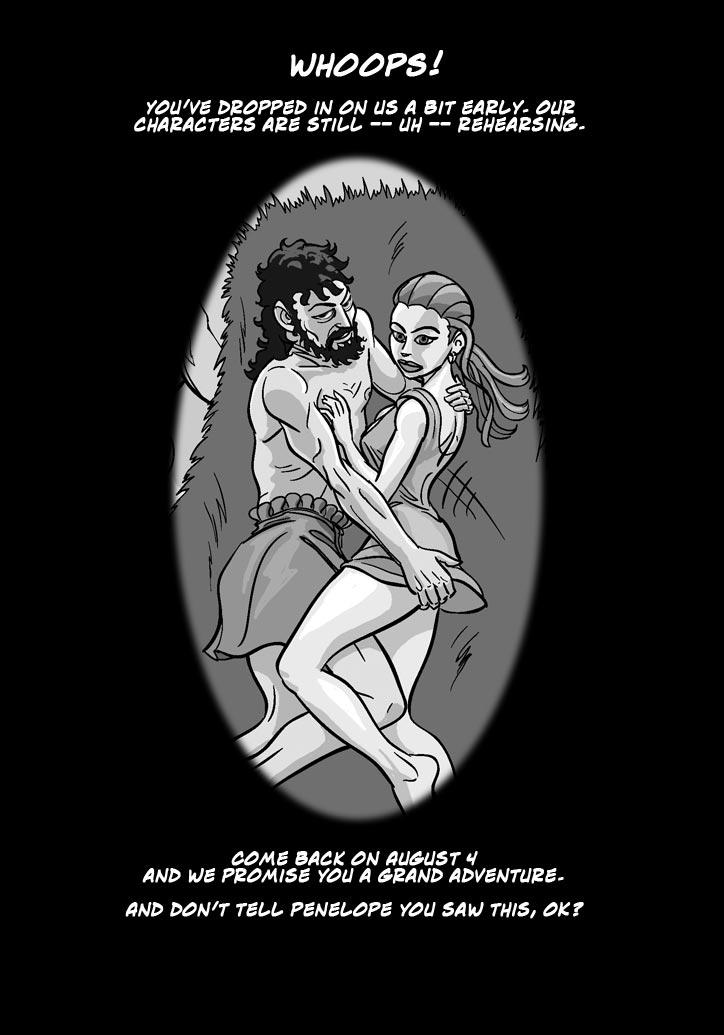Odysseus: Then I’ll die. But I go where I want and ask no leave of god or man. So piss off.
Odysseus the Rebel has some sparkling goddamn dialogue.
has some sparkling goddamn dialogue.
It’s rare to find a Greek epic that isn't inflicted by a PBS sense of aesthetics. From those hoary old Steve Reeves movies to I, Claudius, most sword-and-sandal stories suffer from bad costumes, stilted drama and a sense of reality that owes more to high school text books than to genuine human emotion.
So it was a pleasant surprise when I opened the graphic novel Odysseus the Rebel and found colloquial dialogue that had more in common with Mickey Spillane than William Shakespeare. Odysseus might have had a rebellious spirit in Homer’s original epic, but in writer Steven Grant’s world he literally tells Poseidon to fuck off.
and found colloquial dialogue that had more in common with Mickey Spillane than William Shakespeare. Odysseus might have had a rebellious spirit in Homer’s original epic, but in writer Steven Grant’s world he literally tells Poseidon to fuck off.
Grant re-works The Iliad into a story of modern heroism and paints Odysseus as a badass who’s fully aware of the power of his own myth. Odysseus is also a key participant in an arms race between humanity and the gods. The weapon in contention? Myth.
Rather than simply kill him, the gods – well, mostly just Poseidon – try to break his spirit and crush his myth at its apex. But Odysseus’ spirit is amazingly resilient, not to mention a little obnoxious. It's surprising how likable this character is given his unrepentant arrogance.
Grant sees The Iliad as a battle of wills between the old world and the new, which is the crux of almost every conversation in Odysseus the Rebel. Whether it’s Achilles’ wounded ego after posthumously learning that his myth might have spindly legs, to how Odysseus talks his way out of certain death from mutinous sailors, Grant’s dialogue rivals David Mamet’s in its meticulous subtext. Almost every word balloon in Odysseus the Rebel concerns the struggle between superstition and reason and Grant manages to keep the story on point regardless of where it flows.
If Odysseus the Rebel has a flaw, it’s in the packaging. While comics are probably the best medium for myth (it’s a visual format that puts the realistic and fantastic on equal footing in the audience’s imagination) the art by Scott Bieser is faintly amateurish. While he does an admirable job of capturing the feel of ancient Greek art, the layouts and line work are often simplistic. But it works well enough, even if it fails to impress. The cover design does the book no justice, either, and looks like the kind of thing usually seen in vanity press publications.
The structure of Grant’s story also begins a little awkwardly: the opening scene is a vision, which leads into a flashback before taking the audience into the “now” of the story. It’s a little disconcerting at first, but the story soon finds its rhythm and manages to balance its past with its present (which is no easy task, given the dearth of material that has to be presented here.)
I was actually a little disappointed when the story ended, though the ending was entirely satisfying. It was a wild ride that — despite the age of the material — still managed to surprise. And how often do you see that in comics these days?
I was actually a little disappointed when the story ended, though the ending was entirely satisfying. It was a wild ride that — despite the age of the material — still managed to surprise. And how often do you see that in comics these days?



No comments:
Post a Comment